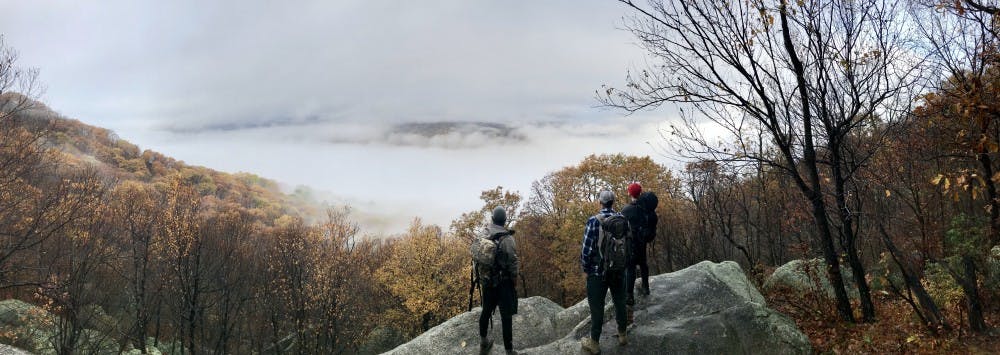Shenandoah National Park, where Old Rag Mountain is a mere two-hour drive from University of Richmond's campus, will raise its entrance fees significantly by June 2018.
At 6:39 a.m. on Nov. 3, Kyle Schmidt, senior, was wedged in the nook of three converging boulders at the summit of Old Rag making coffee.
Schmidt had been kneeling over a boiling cup of water on a tiny camping stove when his friend asked him how much he should Venmo Schmidt for their park passes.
“It was only $10, and you paid that much for my breakfast yesterday, so we’re even,” Schmidt said to his friend.
In June, the hike Schmidt and his friend did could cost a lot more than a meal at Waffle House.
On Oct. 24, the National Park Service announced a proposal to more than double entrance fees at the 17 most popular parks across the country, including Shenandoah.
The entrance fee for foot-traffic at Shenandoah, which is currently $10, would increase to $30, and the vehicle fee would increase from $25 to $70 per vehicle during a five-month peak season beginning on June 1.
The proposal has garnered criticism and concern over whether the fees will push would-be visitors elsewhere.
“We should not increase fees to such a degree as to make these places – protected for all Americans to experience – unaffordable for some families to visit,” Theresa Pierno, president and CEO of National Parks Conversation Association, said in a statement.
Lucia Anderson, the manager of the Outdoor Adventure and Recreation program (OAR) at UR, said that she did not want students to be among those who would be discouraged by the higher park fees.
“For students, that’s a pretty high price tag to go away for the weekend, especially when you tack on the price of outdoor equipment,” Anderson said. “But there are a lot of other options.”
OAR, which hosts several outdoor trips every semester, would not be directly affected by the proposal, as the National Park Service awards academic fee waivers to groups attached to an educational institution.
Enjoy what you're reading?
Signup for our newsletter
“Shenandoah is kind of our primary destination, but the fees generally don’t apply to our program because we can get those waivers,” Anderson said. “We have trips on a pretty much weekly basis that students can join.”
OAR also offers custom trips for groups between six to 20 people, ranging from a half-day, local hike to an overnight camping trip, and gear and transportation are included.
The targeted fee increases are meant to address the maintenance backlog at the parks, the National Parks Service reported in a statement.
“The infrastructure of our national parks is aging and in need of renovation and restoration,” Ryan Zinke, secretary of the Department of the Interior, said. “Targeted fee increases at some of our most-visited parks will help ensure that they are protected and preserved in perpetuity.”
“The solution to our parks’ repair needs cannot and should not be largely shouldered by its visitors," Pierno said.
Anderson said that there were options available for students who wanted to be involved in the outdoors but could not make an OAR trip.
“You can buy an annual pass to Shenandoah or the National Parks that would be worth it if you used it a few times,” she said. “Or students could go to the National Forests instead, like George Washington National Forest right next to Shenandoah."
For Schmidt, who had switched from sitting in his nook to sitting on an overhanging rock with his carefully boiled black coffee and the chilling mist still hiding the views below, entrance fees were far from his mind.
“I’m just going to drink this hot bean water and enjoy being up here,” Schmidt said.
Contact contributor and copy editor Jake Wood at james.wood@richmond.edu.
Support independent student media
You can make a tax-deductible donation by clicking the button below, which takes you to our secure PayPal account. The page is set up to receive contributions in whatever amount you designate. We look forward to using the money we raise to further our mission of providing honest and accurate information to students, faculty, staff, alumni and others in the general public.
Donate Now



